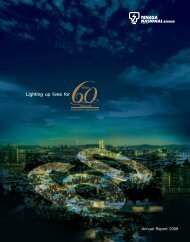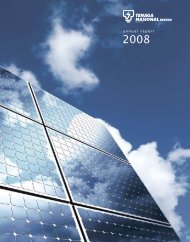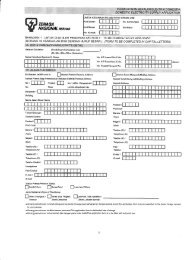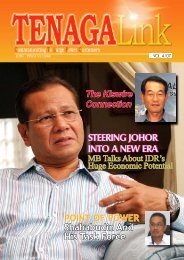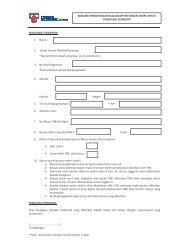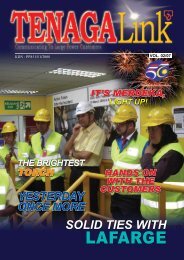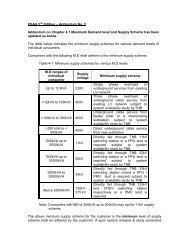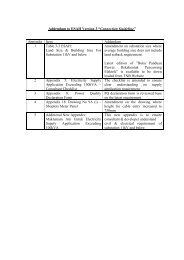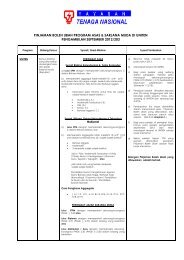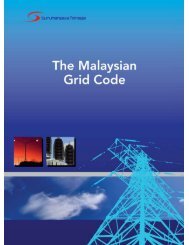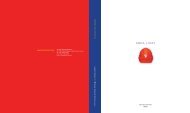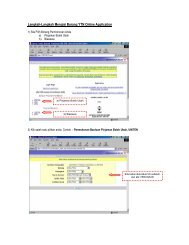contents - Tenaga Nasional Berhad
contents - Tenaga Nasional Berhad
contents - Tenaga Nasional Berhad
Create successful ePaper yourself
Turn your PDF publications into a flip-book with our unique Google optimized e-Paper software.
Profileining Starr StoryBe Proud Ofonsrk Pays Offbrates Hari Rayaidee On Boardstomers – We Arehave You On BoarditesWith Prime Customers/ons- The New DistributionVPllenex 2009Asean’s Future EnergysTHE POWERTHAT GOES ONIr. Hj. Azman MohdVP Distribution Division of TNB3
At first glance, Tuan Hj. Azman Mohdgives the impression of a man of dauntingstature. His dark business suit, smart tie andspectacles immediately bring to mind theimage of a no-nonsense, professional business type whois serious about his work. While the latter description istrue, Azman’s exterior also belies a more compassionateside: one that is deeply concerned about the wellbeing ofTNB’s customers.The Distribution Division’s main task is to managedistribution network operations and electricity retailoperations. It manages over 104 outlets across thecountry, including 37 area offices. Some of their dutiesinclude planning, operating and performing repairs andmaintenance. They are also responsible for purchasingand marketing electricity and connecting new supplies,among other duties.As the new Vice President(VP) for the DistributionDivision of <strong>Tenaga</strong> <strong>Nasional</strong><strong>Berhad</strong> (TNB), these areespecially important qualitiesto have in order to ensurethat responsibilities can becarried out smoothly. Nobodyunderstands this better thanAzman, who has been servingTNB for almost 30 years andis no stranger to hard work.Beginning his career atTNB as an engineer atMentakab, Pahang, hegradually evolved overthe years to higher postsat various offices, holdingpositions such as District Manager in Rawang, GeneralManager in Perlis and General Manager of StrategicManagement and Organisation Development at the mainoffice. Prior to his current position, he held the post ofTNB’s Region 2 Senior General Manager.When asked about how this latest arrangement wouldaffect Distribution Division, his reply is succinct andmatter-of-fact: “The vision and mission is still thesame. They are not going to change just because thevice president has changed. There are certain areas thatwe need to pay attention to, but we feel that we have agood set of priorities. Most important is maintaining theconsistency of our standard and our services.”Of TNB’s three core businesses (Generation,Transmission and Distribution), Distribution is themost interpersonal as it deals most directly with clients’needs such as electricity supply, damages and creditmanagement. As Azman puts it, they are the ‘frontliners’ who spearhead customer services. With such heftyresponsibilities at hand, it is crucial to maintain a closerelationship with clients – especially when one considersthe current global economic downturn and its effect onthe public.“As a company that supplies electricity, we will besimilarly affected since we are secondary customers. Ifour customers are having problems, TNB also faces the4
same situation.”Azman admits that the economic climate does notlook encouraging. Rather than submit to the pessimismthe situation has spurred him and his staff to researchnew strategies that will enable them to provide effectiveand optimal service and consequently ease customers’difficulties during such trying times.“We place a lot of emphasis on cost saving in ourinvestments,” Azman stresses. “We are working to minimizeaction plans. Rather than spending time and money tocreate too many action plans that may cause confusion,we are now more selective and implement only the mosteffective ones. We are also looking at credit managementand towards reducing weaknesses like breakdowns.”One of the new measures they are banking on in thecoming year is the Oscillating Weight Transient System(OWTS), a technology that is able to detect weak jointsin cables and underground cable failures. Previously,such damages were difficult to detect and consumedmuch time as proper equipment was not available.However, with the advent of OWTS, TNB will be able tolessen the frequency of such occurrences in the future.At the moment, OWTS has already been supplied to allmajor states in Malaysia.It is clear that Distribution values positive relationshipwith customers. With over seven million customersnationwide, the best way to maintain such ties is byproviding quick and efficient service so that clients’operations will not be disturbed. When discussing themeasures taken to enhance such services, Azman comesacross as passionate and dedicated to Distribution’s plansand developments. Service standard and performance arethe roots of all consequent results.“We understand that these are difficult times forpeople,” he clarifies. “Our objective is to provide themwith the highest level of service possible to reduce theirsuffering.”“When you walk into a restaurant, or a shop or anyof outlet, you expect consistency, excellence andstandardized service at every branch. This is what weaim to achieve. In the past, there were complaints aboutvarying service levels at different outlets ranging fromgood to less satisfactory. This year, we are setting adefinite standard and putting processes in place for everystation, outlet and manager. The drive is to ensure that allstaff meet the same standard.”“We are currently working with the Energy Commissionto determine a customer service standard level which willbe standardized throughout the Peninsular at all branches,”he reveals. “Our objective is to get all 104 outlets to5
meet the standard, so that not only can our Prime clientsexpect excellent service, but those customers from asfar as Masai and Perlis. Once the Commission sets thestandard, I will also set internal standards that not onlymeets, but exceeds these standards because I believein the long run. If the normal length of time to supplyelectricity is one month and I will set the standard tosupply within 24 hours. This will have a definite impacton customers.”This is not a spontaneous goal; rather one that hasbeen two years in the making since the presence ofISO. TNB is working around the clock to bring thegoal to its desired end through their collaboration withthe Energy Commission. With careful planning, theexpected result will be a service level that far exceedsusual standards.In line with his desire to set a service standard levelthat will ensure enhanced customer service at all outletsnationwide, he is constantly on the lookout for new ideasthat will further advance their strategies. “I’m alwayseager to learn new ways to do things effectively andfaster. I’m thirsty for new strategies - is there a betterway to do the job, with one stroke instead of ten? It’s not6
TNB has segmented service standards into twocategories: external and internal standards. Once theseare defined, brainstormers at the HQ begin churning outideas as to the processes that can meet these standardsand how they can be effectively replicated. Rather thanstruggling to maintain various standards at differentbranches, it is much easier to have one well-developedprocess that can be applied across all outlets. For thisconcept to be implemented successfully, Azman is firmabout changing the current mindset and strategy planningto include a broader and more visionary scope.about making yourself dizzy with many tasks, it’s aboutselecting the best initiative for the job.”Hinting on some of the ideas that are currently beingdeveloped, Azman is enthusiastic about the progress.“We have a systematic model or plan that incorporatescompliance, standards, consistency and service levels,and all the relevant people needed to make it happen areinvolved. I want to do it because it has never been donebefore, and I believe we can do it.”Azman and his staff have not forgotten the mostvital ingredient in making change happen: payingattention to feedback from customers.TNB has variouschannels for its customers to provide feedback such asthe TNB Careline, annual and regular dialogues and otherongoing programs where clients have the opportunity tovoice their opinions. It is through these platforms thatTNB is able to gauge its performance and customersatisfaction rate.“This is a gradual process. The issue right now is thatwe have enough processes, but the degree of complianceand conformity are still somewhat vague,” he remarks.Highlighting the famous Distribution Division’sslogans that is Keep The Lights On, The Faster WeConnect The Faster We Collect, Stop The Bleeding, heacknowledged their importance in promoting a positiveattitude among staff but emphasized that right now,what is needed is “less rhetoric and more action.”On paper, such meticulously laid out plans spellsuccess. Actually executing them, on the other hand, isa heavy task that leaves no room for error. Nonetheless,Azman is confident that his team can pull it off. Helikens Distribution with its many outlets to a franchiseor a formula business, where one outlet has the perfectbusiness and service level which is then replicated atother outlets. “By understanding this concept, we canmeet or even exceed customer expectations and set highstandards,” he adds.Regular interaction with customers ensures a closebond between both parties. With the uncertain future thatthe economic recession brings, it is comforting to knowthat Azman and his team are striving harder than everto provide customers with the quality service that theydeserve. Whatever the future holds, TNB can guaranteeits customers that it will be a light that never dies.7
Cover StoryOne reason SGL Carbon Sdn.Bhd. came to Malaysia was thatafter careful evaluation of itsselection criteria, Malaysia cameout tops over such countries asChina, Indonesia, South Korea, andThailand. In Malaysia, the politicalsituation relative to other countriesis very stable, and this of course isconducive to good business - Thisrevelation came from the ManagingDirector, K. H. Lim.K. H. LimManaging Director, SGL Carbon Sdn. Bhd.WEATHERING THE ECONOMIC HAZE- The SGL WayTell us about the background of SGLCarbon Sdn Bhd.SGL Group has a very long history, if youlook at its predecessor companies, ourbusiness history is more than 100 years.Very briefly, our history goes back to thetime when SGL was formed in 1992 as a8merger between SIGRI, a German company,and Great Lakes Carbon in the UnitedStates. SGL is an acronym for ‘SIGRI-Great Lakes’. The SI in SIGRI comesfrom Siemens, whereas the GRI stands forGriesheim, a town just outside of Frankfurt,where one of our earliest plants was foundedand is still in existence. SIGRI was a jointventure between Siemens and the formerpharmaceutical and industrial conglomeratenamed Hoechst AG.Then in 1995, SGL Group was formedwhen we were listed on the Frankfurt StockExchange. As a group, we also acquiredmany other carbon and graphite producers in
We were granted a manufacturing license,but as I noted earlier, we did not operatethe company until around 2002, because itwas set up for the purpose of manufacturinggraphite electrodes, one of our key productsused in the steel industries. Additionallythere was the 1997-98 Asian financial crisis,which affected our business in that period,therefore we did not pursue our project atthat time. Later on, around 2001-02, there wasa crisis in the American steel industry, whichalso led to a poor global steel market. This,too, was a factor in the delay.Europe, for example in France and Poland.In 1997, we set up the first operativecompany in Malaysia i.e. SGL CarbonAsia-Pacific Sdn Bhd as our regionalheadquarters. The other company, SGLCarbon Sdn. Bhd., was already set up in1995, but it remained non-operative until2002 because it was set up as a manufacturingconcern.Tell us about the history of its incorporationin Malaysia. Why Malaysia was chosen asthe graphite hub operational HQ for SGLGroup in Asia?In 1995 we started SGL Carbon Sdn. Bhd.,incorporated as a manufacturing company.But we always maintained the longtermintention to invest and start a plant inMalaysia to manufacture graphite electrodes.In fact, even before we received our license,we had been going around the country toinspect some possible sites for the project.Initially we identified the East Coast,specifically Kemaman. In 2002 we shiftedthe site to Banting.In 2004, the SGL Group headquartersdeclared that the future of SGL will bedecided in Asia. This is a very strongstatement. When you make a statement likethis, you have to put it into action. Asia is agrowing region. Traditionally, our businesshad been focused on Western Europe andNorth America. But for our future growth,we envisage that the Asian region will be themost dynamic location. Therefore we havedecided to spread out our production plantsand facilities, and we have chosen Malaysiaas the graphite hub of the Asia-Pacific region.One reason we came to Malaysia wasthat after careful evaluation of our selectioncriteria, Malaysia came out tops over suchcountries as China, Indonesia, South Koreaand Thailand. In Malaysia, the politicalsituation relative to other countries is verystable, and this of course is conducive togood business. We are also monitoring thepolitical developments here in the pastyear, and it seems to us that this country ismaturing into a more democratic society.The Government of Malaysia is pro-businessand fully support foreign direct investmentsin particular one of a global scale like ourproject.Malaysia also stands out well in terms ofinfrastructure, especially the airports andharbours. One of the reasons we are locatedhere in Banting is the proximity to KualaLumpur International Airport. Additionally,the country’s major seaport is only 30 minutesaway from where we are.From a logistic point of view, Malaysia isalso strategically-positioned in South-EastAsia region. The investment policies and thetax incentives are excellent. In the courseof this project we have not encounteredany major problems with the authorities.So far, they have been very cooperative andunderstanding.Of course, we also have other investmentsin China. At the moment, these are our twomost important cornerstones in Asia: Chinaand Malaysia.What are your company’s main activities?What is the range of carbon-basedproducts that your company produces?What are the main products and what arethey used for?We are one of the world’s largest carbon andgraphite producers. We have a very highdegree of expertise and technology in carbonfibres, composites and other carbon-basedproducts, not to mention fine-grain andcoarse-grain graphite materials.The applications for these products arevery wide indeed. In Malaysia we willprimarily manufacture graphite electrodesand graphitized cathodes on the 45 acres offactory space that we occupy. In the midtermrange (two or three years in the future)we see good potential in expanding into moreadvanced graphite-material production.Graphite electrode is used in the steelindustry whereby electric arc furnaces arecharged with scrap-metal for recycling tomake steel. They act as conductors to powerthe furnaces. For this reason, our electrodesare important to the steel industry. Graphiteelectrodes are consumable; the electrodesare burnt off in the melting process and youhave to keep adding more electrodes in theprocess.On the other hand, graphitized cathodesare used in aluminium smelting. In contrastto electrodes, cathodes are investmentproducts employed in electrolysis ofalumina. Thus they are non-consumableitems and are part of the processing equipmentin aluminium smelting. Graphitized cathodesare only replaced after much wear and tearfor example every six or seven years.We also produce carbon-fibre composites,specialty graphites e.g. for application insolar cells, automotive parts, aerospace andother very wide ranging applications.9
and very resistant to high temperatures. Ithas an advantage over heavier materials.Our company is oriented towards thefuture. We predict there will be more andmore applications for carbon and graphiteproducts, for example in lithium-ion batteriesfor laptops, cellphones, solar energy, fuelcells, silicone wafers and the like. In Asia,steel and aluminium demand will risesharply in the long term due to our rapidlyurbanizingpopulation and ever-higherstandards of living.In Europe, wind power is an importantsource of renewable energy. We are supplyingcarbon composites for the turbine bladesused to generate wind power. Previouslymuch of the material was steel, especially sowith offshore wind turbines.As for future cars running on fuel cells,there will be no need to pump petrol, and theresulting exhausts will not consist of carbondioxide, but water!So all this translates to good growthprospects for the carbon and graphiteindustry. We are very bullish on the future.What will be the biggest business issue ofyour company this year?The biggest issue will be in managing oursales and production costs to cope with thelower demands. We wish to avoid as manybad debts as possible. At this time, we alsoneed to look into strategic partnerships withstrong customers.We are very client-focused. We arecurrently devising a program calledCustomer Value Initiative to improve thequality of our products and services forexample, reducing variation and increasingconsistency in high quality.What are your marketing functions toaddress your customers’ needs and wants?Strategic partnerships are essential to us.We’re looking into key global accounts aspart of our long-term plan. Through ourCustomer Value Initiative, we study thedemands of our customers – issues like ontimedelivery, our commercial practices andour reputation. Customer satisfaction is veryimportant.Your company’s claim, “Broad Base, BestSolutions”. What does it reflect?What we mean by “Broad Base” isour experience in carbon materials andtechnology as well as our global presence.As for “Best Solutions”, it comes to thenumerous applications for our products andwhat we can do with regards to our goods,services, and innovative ideas to help ourcustomers find application solutions.What are the work principles thatyou want your staff to exemplify andpractice?Personally, I’ve been in the corporate worldfor almost 30 years, and I always look fora few basic qualities. To me integrity isimportant. One must retain one’s integritythrough good times and bad. Discipline inwork ethics is another vital attribute. So areempowerment and teamwork. In the end,my staff must always remind themselvesthat customers come first. This is part of thespirit of SGL Excellence.What is the company’s commitment inenvironmental affairs?At SGL we have always paid strictcompliance to environmental regulations.We respect the environment in which weoperate. In fact, as an international company,meeting environmental standards is only thestart. We always try to do better than what isalready established by current standards.In our organization we have an EHS(Environment, Health and Safety) manager.Since this is a new project, we’ve alsoengaged an EHS consultant to conductenvironmental audits in addition to thosefrom the local authorities. We also provideregular safety and environmental awarenesstraining for our staff.Being a hi-tech manufacturing company,you rely substantially on the efficientsupply of electricity power. Yourcomments on TNB’s performance thusfar as an electricity supplier, in itsservices and technical assistance?We will be one of the largest consumers ofelectricity in the country, with estimatedconsumption rates of up to 45 MW. So far wehave not started production; the first stagewill commence in March.From past experiences, especially whilewe were in negotiations to build a substationon our plant, our relationship withTNB has so far been a fruitful one. I myselfwas personally involved in talks with yourconsumer services department, and I foundthat at the operative level, the managers thatI dealt with from the technical departmentand the head offices in Bangsar and PetalingJaya were very customer-friendly. I have onlygood words to say about TNB’s operations.We were also told that this project is the firsttime that TNB is financing the sub-station.This shows that TNB is open-minded andwilling to be innovative.One thing I should point out, however, isthat with TNB being a very large corporation,bureaucracy is inevitable. When it comes toobtaining approvals, it can be a very lengthyprocess. Probably there are a lot of decisionmakersalong the way, and I find this to bevery bureaucratic. For instance, sometimeswe would only obtain the signatures onour agreements after six to eight months.Perhaps the system needs a little fine-tuninghere and there. Otherwise, everything elseis good.Malaysia has very reasonable electricitytariff rates compared with many othercountries in Asia. We do know that the tariffhere is regulated by the Cabinet. Thus thereis no need for long-term contracts becausethe government protects the tariff. Wehope that in the long run, the governmentwould continue to look into the interests ofmanufacturers to ensure our competitivenesswith regard to electricity rates.11
WE ARE PROUD TO HAVE YOU ON BOARDMONASH UNIVERSITY SUNWAYMonash University was invited by the Malaysiangovernment to open a campus in 1998. Through along-standing partnership with the Sunway Group,the first foreign university campus in Malaysia wascreated at Bandar Sunway in Petaling Jaya. Classescommenced in July 1998.As a full campus of Monash University we provide adistinctive international experience, with excellencein teaching and research. In addition, students alsobenefit greatly from our innovative approaches toenhancing their university experience through studentmobility, community engagement and research. Weengage with Malaysian and regional societies toimprove the human condition.Professor Robin PollardPro Vice ChancellorThe Sunway campus is a dynamic community ofscholars comprising staff and students, supportedby collegial processes and comprehensive first-classinfrastructure, and aspiring to intellectual achievementof the highest order. At present there are some 4,000students and 400 staff, with growth projected to leadto over 6,000 students and 600 staff.Now over ten years old, theSunway campus ofMonash University is an exemplar of transnationaleducation. About one quarter of the student bodyis international. The campus continues to developsteadily, and now enjoys excellent facilities forworld-class education and research. All academicstaff members are expected to engage in scholarlyresearch.Monash UniversityJalan Lagoon Selatan,Bandar Sunway, 46150,Selangor Darul Ehsan,MalaysiaTel No. +603 5514 6000Fax No. +603 5514 6001Website : www.monash.edu.myEmail : info@monash.edu.myLION GROUP’S STEEL OPERATIONScater to the requirements of domestic customers as well asinternational markets. Antara Steel Mills’ location in the southof Peninsular Malaysia is also well placed to cater to thesouthern region including the Asean market. A commitmenttowards prompt and reliable delivery services has enabledAmsteel Mills and Antara Steel Mills to gain both local andinternational acceptance and customer satisfaction for theirproducts and services.Furnace with fireBillet castingAmsteel Mills Sdn Bhd, a member of The Lion Group commenced operations in1978. It operates two steel mills, in Klang and Banting, both in Selangor, which areequipped with modern facilities comprising Electric Arc Furnaces of 85-ton and160-ton respectively, 6-strand Continuous Casting Machines and Ladle Furnacesto produce billets for rolling into bars and wire rods. The Banting mill producesspecial grade bars and wire rods for automotive parts, mattress and mechanicalsprings, turning parts, wire ropes and other specialty usesAnother mill operated by The Lion Group under the name of Antara Steel MillsSdn Bhd in Johor produces billets and bars including angle bars and U-channels.Together, Amsteel Mills and Antara Steel Mills have a total steel making capacityof 3.05 million tonnes per annum and rolling capacity of 2.35 million tonnes perannum. Antara Steel Mills also operates a 900,000 tonne per annum hot briquettediron (HBI) plant using the Midrex Direct Reduction technology in Labuan, EastMalaysia.Combining human skills, experience, technology andequipment, Amsteel Mills and Antara Steel Mills haveestablished themselves as reputable mills in supplying qualitysteel products to the domestic and international markets. Themills’ commitment to quality is proven with their achieving theISO 9002 Quality System awarded by Standard IndustrialResearch Institute of Malaysia (SIRIM) and British StandardsInstitute (BSI).The Lion Group also operates an integrated flat steel mill,Megasteel Sdn Bhd in Banting, which has an annual capacityof 3.2 million tonnes of hot rolled coils and 1.45 million tonnesof cold rolled coils.The Group’s new direct reduced iron (DRI) plant in Banting,Lion DRI Sdn Bhd has a capacity of 1.54 million tonnes perannum and also uses the Midrex technology to produce DRIto make high grade steel.Wisma Lion,Lot 2319, Kawasan Perindustrian Olak Lempit,Mukim Tanjung 12,42700 Banting, SelangorTel No. 03-31816666 / 8866Fax No. 03-31816921Strategically located in the Klang Valley in Peninsular Malaysia, Amsteel Mills’proximity to Malaysia’s premier port, Port Klang, makes it ideally located toWebsite : www.lion.com.myEmail : corpcomm@lion.com.my15
SurveysTNB Customer Satisfaction Index 2008Summary ReportSince its first execution in 1994, a total of 10 surveysof the TNB Customer Satisfaction Index (CSI) havebeen carried out. The survey was conducted by anexternal Service Provider (International) and since1998, Taylor Nelson Sofres Sdn. Bhd, a London basedcompany has conducted 8 of the TNB CSI surveys.Survey respondents are from TNB’s CustomerGroups i.e Residential, Commercial and Industrial,in all 13 regions which covers 11 Peninsula states,including Federal Territory and Putrajaya. The CSIhas objectives as follows:To measure satisfaction of customers by surveysamplingTo obtain an overall index for Service LevelsimprovementTo obtain feedback for TNB service categoriesTo identify action plans to improve ServiceLevelsAs a matter of fact, the CSI is a vital barometer towards achieving Service Excellence by 2010.The survey used the quantitative face-to-face approach from Customer Base. Structured questionnaires were formulatedon 11 service areas and the ratings are based on performance using the 10-point scales. These ratings were based on theservice or usage experiences in the 12 months period. The sampling was made according to statistically accepted levels. Forthe Residential group, it was done door to door by random, while for the Commercial and Industrial groups, the businessdirectory and TNB customer lists were used.The sample size obtained for the Residential group was 3896, 2168 for Commercial and 2489 for Industrial group, thusmaking the total sample size of 8553. The survey respondents have to meet certain criteria; for Residential, the criteria is anadult 18 years old and above, and is the main person responsible for the household utilities (bill payment, making enquiries,maintenance). For Commercial and Industrial, the criteria is the main person is responsible for the company/building utilities.ResultsOverall there is an increase in the 2007/08 CSI scores in all customer groups, over the previous year’s (2005/06) scores. In theResidential group, the score is 7.3, Commercial group 7.2 and Industrial group 6.9, compared to 7.1, 6.8 and 6.6 respectivelyin the 2005/06 survey.The following chart shows the overall TNB CSI 2007/08 Score.TNB CSI ScoresTNB CSI Scores6.36.36.86.86.66.66.76.76.96.97.07.06.76.76.96.96.86.87.17.1The total average score of 7.1 94 points / 95 96 for / 97all 97 customer / 98 98 / groups 99 99/00 is the 00/01 highest 01/02 over 04/05 the last 05/06 10 years, 07/08 and also the highest incrementof 0.3 points over the previous year score. This year’s score also marked for the first time in more than 10 years, the overall CSIscore exceeds 7.0 points. This is a strong indication that achieving service excellence by 2010 is on the way.1694 / 95 96 / 97 97 / 98 98 / 99 99/00 00/01 01/02 04/05 05/06 07/08
RegionalHaji Abdullah Basir Abdul GhaniGeneral Manager of TNB MalaccaTHE MAN INMALACCAIt takes firm perseverance to retainpassion for one’s work, especially ifthey have been toiling in the sameprofession for years on end. For HajiAbdullah Basir, General Manager ofTNB Malacca, 25 years of experiencewith TNB has not diminished hisenthusiasm for his job in the slightest.A graduate of the University ofManitoba, Canada, Basir first honed hiscraft at TNB at the Temerloh, Pahangoffice for 8 years before being promotedto District Manager in Bentong. Hiscareer took him through several otherstates including Johor, Kelantan andKuala Lumpur during what he jokinglycalls his “two-and-a-half-year era”where coincidentally, all his postingslasted for the exact same length oftime.Now based in Malacca, Basir hasadapted well to the post of GeneralManager. “I’ve learned much fromthis company in terms of knowledge,training and experience in managing theelectrical system in this state. I’ve beenin various divisions and met all kindsof people. It is a kind of responsibility Igladly take on as a way of repaying thecompany for all they have done for me.17
It is never a matter of superiority.”Although Basir has settled down quitecomfortably, this hardly means that hehas time to be idle. State governmentexpectations in Malacca are high when itcomes to service standards, and TNB isno exception. Basir credits Malacca ChiefMinister Datuk Seri Mohd Ali Rustamfor setting such standards and havinga clear vision of developing Malaccainto a benchmark that other states mayemulate.“Of course, it is as important to meet oreven exceed the standard as it is to set it,”Basir concedes. “We are aiming for zerointerruption where the staff is able to workindependently but capably, aswell as faster service andbetter communication betweenthe staff and customers.” Hecites Singapore as an exampleof a country with well-managedinfrastructure and speedyservice.Basir is quick to elaborateon TNB’s hands-on and tirelessnature. “When there is noelectricity, customers feel theheat on the outside, but wefeel the heat both outside andinside. What we can do isto convince them, the stategovernment and the ChiefMinister through our actionsthat we are an excellentorganization that providesproducts that are far beyond theusual standards.”TNB pulls out all stops tomaintain a stable relationshipwith its customers. Primecustomers, who contributeabout 80% of revenue, are especiallyimportant. “We visits and regularinteractive discussions with them.We regard them as partners and notjust clients. There are no barriers, andcommunication must be open andtrusting.”TNB Malacca also hosts specialPAIR (Prime Account InformationRepresentative) programs, which aresimilar to CARE programs in KualaLumpur. Every officer is tasked with18several Prime customers whom he iswholly in charge of. The concept is toregard the officer and customer as a pairor a partnership. PAIR is an ongoingprocess and Basir hopes that in thefuture, all industries will be involved inthe programme.So far, TNB has made severalaccomplishments in Malacca thatthey can be proud of. These includeMalacca International Trade Centre inAyer Keroh and Eye on Malaysia Ferriswheel near the Malacca River. Thanks topunctual, impressive service, the supplyof electricity to both areas is smooth andhas not suffered any interruptions. Inaddition, both places have boosted statetourism considerably.Even as the country’s currenteconomic state continues to be bleak,Basir has not lost sight of plans tocontinue expanding Malacca’s potentialas an industrial state and touristdestination. With the Zarina IndustrialPark already in place in Alor Gajah,ongoing efforts to construct moreshopping complexes will stillproceed, along with initiatives for theinternationalization of the MalaccaAirport and the acquiring ofthe world heritage status for thestate.“The core of moderndevelopment rests onelectricity,” he affirms. “In orderto ensure that plans stay afloat,they must be supported by TNB.Fortunately, we are capableof providing such supportwhenever needed.”As crucial as electricity is tothese projects, it is useless tohave sophisticated machinerywithout the good humanresource. Competency andexperience play an importantrole. Given that the structureof manpower in Malacca stillleaves a little to be desired, Basirand his staff are working hard toenhance overall performance.In dealing with occurrencesof power interruption, researchnew ways to reduce suchproblems are conducted. A recentdevelopment is OTS - Oscillating WaveTest Set equipment, which costs closeto RM 1 million but is surely a worthyinvestment for Malacca in the long run.Basir further comments that they haveto take into account the sensitivity ofcustomers and the state government.The best way to reduce breakdowns isto prioritise and take the most effectivepreventive measures possible.Ultimately, our hope is that all relevant
parties will continue to give their supportto Malacca. Collectively, we can realizethe business potential of the state andsuccessfully face the challenges.”Even with so many projects under hisbelt, customer can rest easy in knowingthat Basir is a man of consistent workprinciples. “The boss must be a livingexample to his staff to be,” he insists.“If he has set a standard, he must teachhis staff not merely to meet it, but to gobeyond it.Inevitably, there are times when we feelexhausted and lonely, wondering whywe fight this battle. To me as a Muslim,work is a form of worship. When wefeel defeated, it is up to us to determinewhether we are sincere about our workor not. We are also blessed with somuch in terms of education andknowledge, and we have to use themto the best of our abilities. Our outputreflects our real self and when we don’tdo our best, we are actually loweringour own position?”men are looking to find new ways totrain their staff to become experts attheir work, especially considering thevast number of projects being carriedout in Malacca.In the long run, Basir’s prime concernis ensuring that TNB carries out all theservices that it can offer to its customersto the best of their abilities. For thisman, rest is not an option as his workcarries more meaning to him than justfulfilling his duties and receiving amonthly paycheck.On the other hand, Basir is keento avoid what is commonly termed“success syndrome”. “We do notwant a situation where Malacca is at asuccessful stage and the staff feel thatthey deserve to relax their standardsand be stagnant in their efforts. It isa dangerous place to be in. Our staffare already quite capable. Our mainchallenge is to keep them continuouslymotivated. We are confident that TNBMalacca will gradually improve their itswork standard and bring us to be number1 in the country.”Another common challenge facedis the transfer of experienced officersto other areas, who are then replacedwith newcomers who need timeto adjust to the field. Basir and his“We should always examine thebigger picture of our work. Our job isnot just to connect cables, for instance.This job brings a ray of light into ourlives. Connecting cables is our mannerof contribution towards making others’lives happier.”19



